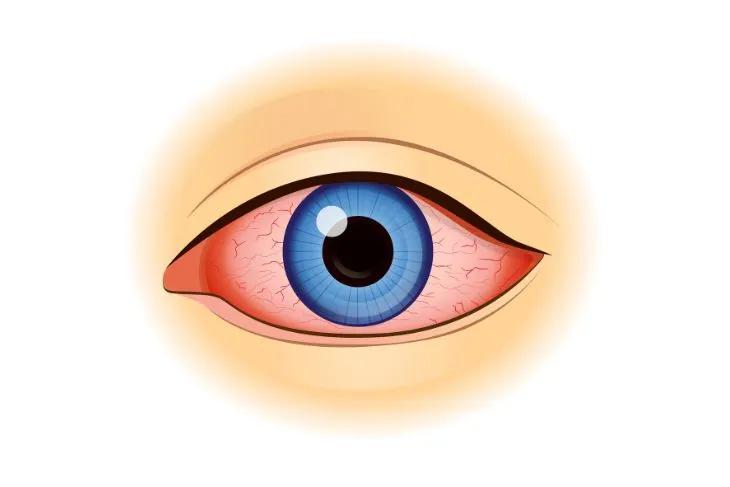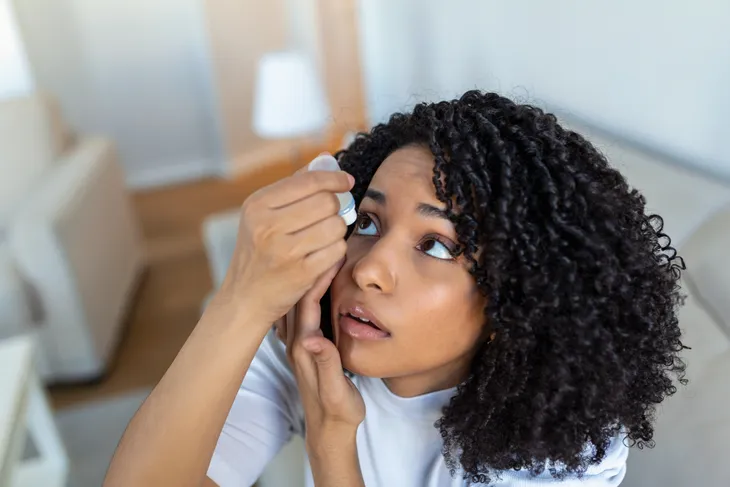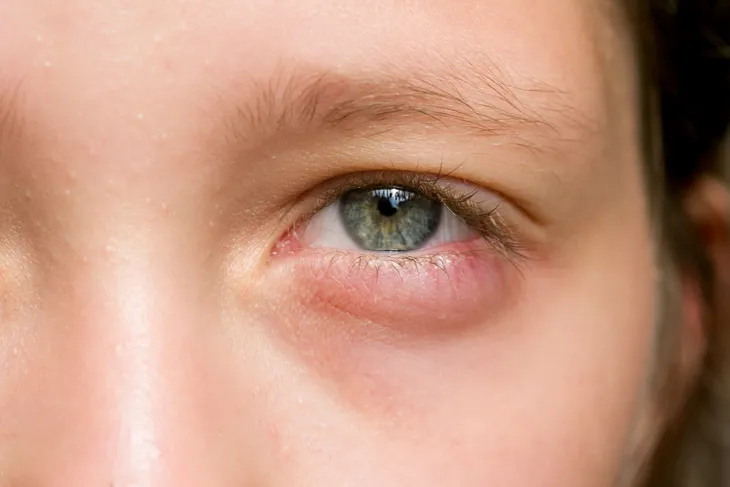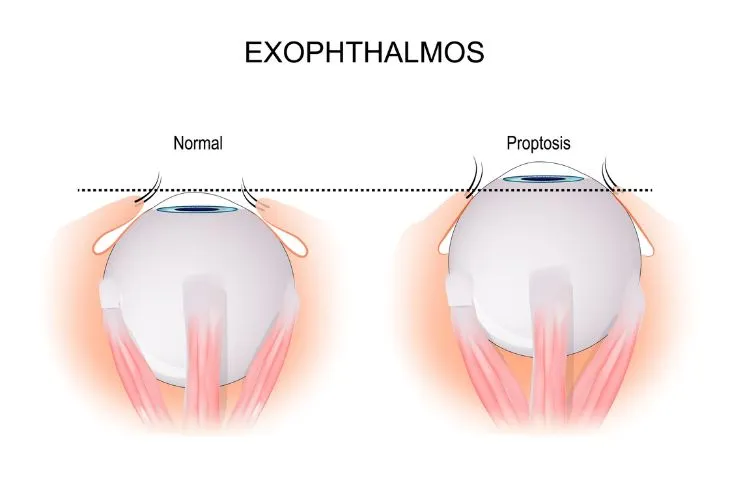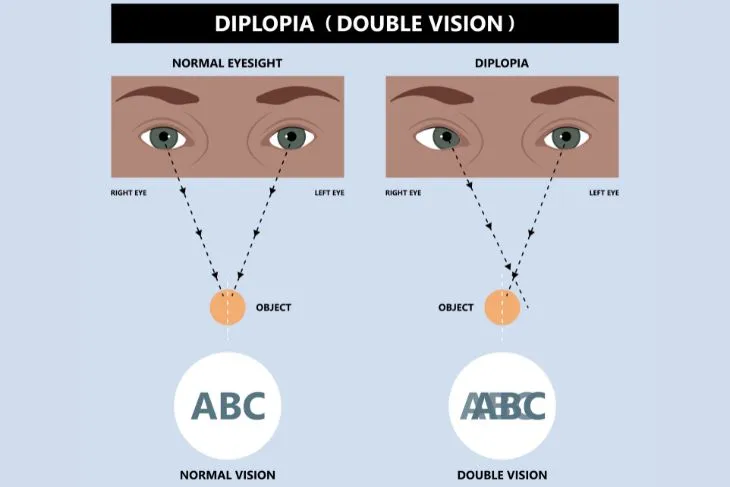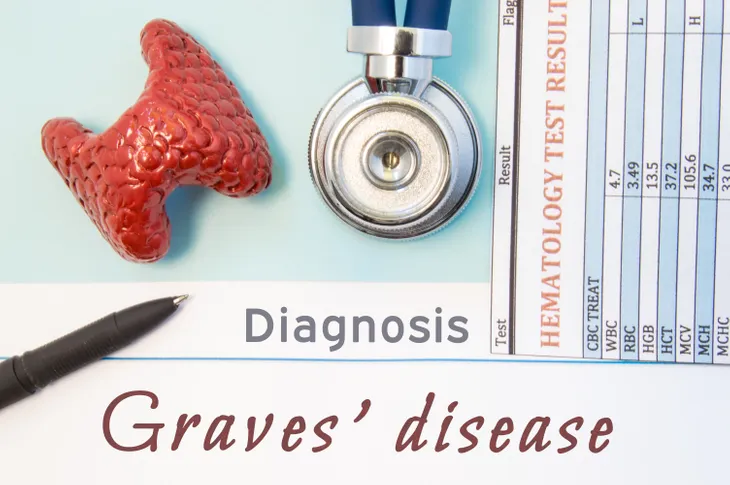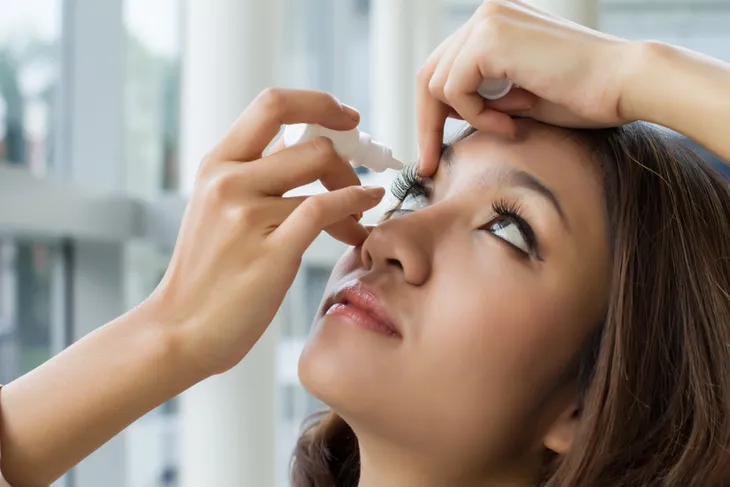- Thyroid eye disease is a rare condition that sometimes develops in people with Graves’ hyperthyroidism.
- It’s an autoimmune disease that causes the body’s immune system to attack itself, specifically the muscles and tissues around the eyes.
- Some of the most common symptoms are redness, dry eye, swelling, watery eyes, bulging eyes, double vision, or even vision loss.
Most people have heard of thyroid disease, but not thyroid eye disease. That’s because it’s a rare disease that results from “progressive inflammation and damage to tissues around the eyes, especially extraocular muscle, connective, and fatty tissue,” explains the National Organization for Rare Disorders (NORD).
It often develops in people who already have thyroid disease, particularly Graves’ hyperthyroidism. For those who want to learn more about this condition, here’s a look into the signs and symptoms of thyroid eye disease…
What is Thyroid Eye Disease?
Thyroid eye disease is a rare condition that sometimes develops in people with Graves’ hyperthyroidism, says VeryWell Health. In fact, the Cleveland Clinic states its sometimes the first problem people notice which brings them to the doctor’s office. That’s because it can cause people to have all kinds of issues with their eyes, from dry eyes to difficulty closing their eyes.
Similar to other thyroid conditions, thyroid eye disease is an autoimmune disease. It causes the body’s immune system to attack itself, specifically the muscles and tissues around the eyes.
Redness
Redness is often a symptom in mild cases, says Madina Falcone, MD, the director of oculoplastics and orbital surgery at the University of Connecticut Health in Farmington when speaking to Everyday Health. The redness is a result of inflammation triggered by the autoimmune disease.
Because there are many different conditions and ailments that can cause redness in the white parts of the eye (conjunctiva), it’s one symptom that is often overlooked or brushed off as being something else. “Patients are commonly told that they have an allergy or this is just a symptom of aging,” says Dr. Falcone to the source.
Dry Eye
Grittiness, more commonly referred to as dry eye, is another common symptom of thyroid eye disease. We call it grittiness because when a person is suffering from dry eye it feels gritty. Thyroid eye disease leaves a person suffering with this sensation constantly.
It occurs as a result of inflammation which is also responsible for a range of other issues within the eye. Everyday Health talked to Andrea Kossler, MD, FACS, an assistant professor of ophthalmology at the Stanford University Medical Center in Palo Alto, California, who is also a thyroid eye disease specialist. She says patients can combat this feeling by using artificial tears to restore lubrication.
Excessive Tearing
While we just talked about how thyroid eye disease leaves people constantly feeling like they have dry eyes, the same symptom can also lead to excessive tearing. How does this work? Well, in a strange twist of events, according to the Mayo Clinic, dryness can lead to watery eyes as the body tries to combat the irritation.
In an attempt to fix the issue of dry eyes, the body will ramp up its tear production which then leads to excessive tearing.
Swelling or Puffiness
We’ve all suffered from a little swelling or puffiness after a poor night’s sleep, but with thyroid eye disease this inflammation is much worse. Thankfully, Everyday Health reassures this particular symptom can be treated with the help of steroids.
However, if the condition is able to progress without swift treatment, the following symptoms, proptosis and the ‘thyroid stare,’ can occur which are much more difficult to fix. With these symptoms, the swelling becomes so bad it affects not only the eyes, but the muscles and tissues around the eyes.
Proptosis (Bulging Eye)
Proptosis is just a fancy way of saying bulging eyes. This symptom is a result of inflammation. It occurs when “inflammatory cells in the orbit (the bony cavity where the eyeball sits in your skull) becomes activated, stimulating orbital tissue to expand,” says Falcone to Everyday Health. “The muscles that surround and move the eye enlarge, and the fat that surrounds and cushions the eye also thickens,” she adds.
All of this inflammation causes the area of the eyes to become bigger and bulkier. The end result is that the eyes are bulging forward out of the skull. “In the past, we used to treat people with steroids to address redness and swelling, but it didn’t have a great effect on the position of the eye,” says Falcone to the source.
“Thyroid Stare”
What’s known as the “thyroid stare” is quite similar to proptosis in that it’s basically when the eyes bulge forwards. In this case, the eyes are bulging forward so much that the eyelids become pushed back and the muscles that are responsible for opening and closing the eyelids become bulky, explains Everyday Health.
“This leads to the ‘thyroid stare,’ where patients look like they’re staring,” says Falcone to the source. People who have this symptom might experience difficulty closing their eyes.
Double Vision (Diplopia)
Double vision, also known as diplopia, is an awful symptom on its own. What makes it worse is all the side effects that come with it. These include dizziness, unsteadiness hindering their ability to walk, and headaches. Falcone tells Everyday Health that with thyroid eye disease double vision is constant and consistent.
“With thyroid eye disease, people might have flares, or worsening of the redness, swelling, and grittiness, that go away,” says Falcone to the source. “However, usually once they start to notice symptoms like bulging and decreased vision, these symptoms don’t resolve without treatment.”
Vision Loss
Being able to see is certainly one of the five senses that we take for granted. Most of us probably don’t think too much about it on a daily basis because it’s just part of being human. It’s when we start to lose our vision that we truly realize what a gift it is.
People with thyroid eye disease can sadly suffer vision loss. The most severe forms of this disease will produce these results, says Everyday Health. Kossler tells the source that vision loss occurs when the optic nerve, which is responsible for tethering the eyeball to the brain, is compressed.
Symptoms of Progressive Thyroid Eye Disease
Like many conditions, the goal is to treat thyroid eye disease quickly before the symptoms progress and become much worse. The longer the condition goes on without treatment, the harder it becomes to treat and the worse the symptoms are.
VeryWell Health lists the following three symptoms as symptoms of progressive thyroid eye disease: increased sensitivity to light, impaired vision, and difficulty moving or closing the eyes. The source also notes that this condition can go through stages of severity and even periods of remission. “It often lasts six months to two years,” writes the source. “When it has been inactive for a period of around a half a year, it’s less likely to recur.”
Who’s at Risk?
The highest risk group of people are those who already have thyroid disease, specifically Graves’ disease. According to VeryWell Health, 50-percent of people with Graves’ disease will also have symptoms of thyroid eye disease.
However, this condition can also be seen in people who have no previous thyroid disorders. The source notes that it occasionally appears in patients of Hashimoto’s disease, but for the most part, people with thyroid issues will not develop thyroid eye disease. If they do, it’s often a mild case. Smokers should be wary as this lifestyle habit can make any symptoms worse.
Treatment Options
Treatment will depend on the severity of the case. If it’s mild, applying lubricating eye drops and artificial tears a couple times a day can help manage the symptoms. VeryWell Health advises avoiding wind and bright light. However, if the symptoms are more severe, a doctor might have to prescribe stronger medication.
A small percentage of patients may need orbital decompression surgery. “This procedure removes the bone between the eye socket and the air sinus behind it so your eye has more room,” writes VeryWell Health. “This can improve your vision but there is a risk of double vision.” Double vision is also a possibility when scar tissue makes the eye muscle too short. Another surgery can be used to fix this and reattach the muscle to a point that is a more appropriate length. The same source warns more than one surgery may be necessary.


